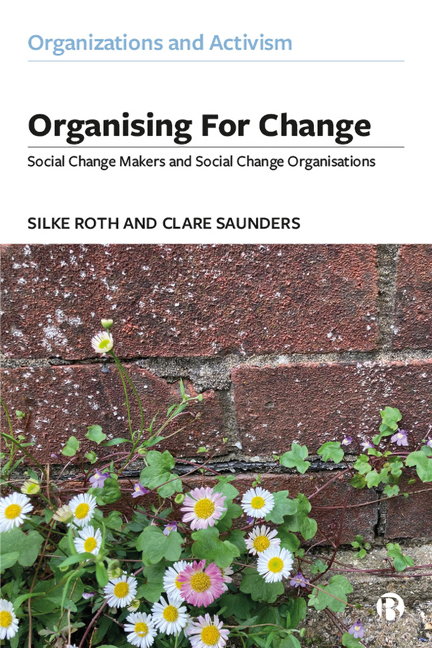Book contents
- Frontmatter
- Dedication
- Contents
- Series Editors’ Preface
- List of Figures and Tables
- Acknowledgements
- Introduction
- 1 What Are Social Change Makers and Social Change Organisations?
- 2 The Big Picture: Social Change Makers and Social Change Organisations in Historically Variable Contexts
- 3 Ways of Making Change
- 4 No Such Thing as a Free Gift: The Sources and Consequences of Resource Choices
- 5 People Making Change
- 6 Collaboration, Competition and Conflict
- 7 Outcomes of Social Change Making
- Conclusions: Organising for Change
- Appendix: Our Projects
- Notes
- References
- Index
Conclusions: Organising for Change
Published online by Cambridge University Press: 28 March 2024
- Frontmatter
- Dedication
- Contents
- Series Editors’ Preface
- List of Figures and Tables
- Acknowledgements
- Introduction
- 1 What Are Social Change Makers and Social Change Organisations?
- 2 The Big Picture: Social Change Makers and Social Change Organisations in Historically Variable Contexts
- 3 Ways of Making Change
- 4 No Such Thing as a Free Gift: The Sources and Consequences of Resource Choices
- 5 People Making Change
- 6 Collaboration, Competition and Conflict
- 7 Outcomes of Social Change Making
- Conclusions: Organising for Change
- Appendix: Our Projects
- Notes
- References
- Index
Summary
Throughout the book we have argued that SCOs are as much shaped by historically variable contexts as they in turn shape this context in interaction with other SCOs. Recognising SCOs as co-creators of social change invites us to consider together temporality, interaction, and the variety of forms of SCOs, and to do so within the broader historically variable context. The factors that allow SCOs and SCMs to secure social change vary across time and place. Thinking in this way alerts us to the magnitude and complexity of disentangling SCO outcomes – on each other, on SCMs, on policy, on legislation, on institutions and on culture as well as in relation to broader social, economic, cultural, and technological contexts at multiple (local, national, and international) levels over time. We therefore stress the value of our holistic approach, which encourages us to think realistically about the very real challenges of accurately tracing the outcomes of SCOs back to the source or sources from which they originated.
It is, nonetheless, important to recognise how an outcome in one sphere (for example, cultural or biographical) might set on course some chain reactions in different spheres (for example, political or material). Indeed, this is probably one reason why existing work on the outcomes of SCOs is currently unclear about the precise mechanisms through which outcomes are secured. This is part of the beauty of our approach: a simple, linear, theory of ‘organising for social change’ would do injustice to the multiple processes at play within and among SCOs and their broader historically variable context. A holistic account of the outcomes of organising for change must recognise how individual, SCO-sector, socio-cultural, and socio-political outcomes come to shape one another in usually unpredictable ways.
Throughout this book we have examined varieties of SCO and a range of intersecting classes of SCMs. What are the lessons learned and what are the implications of our intervention? In this, our concluding, chapter we first highlight the relevance of our work to the circumstances we find ourselves in at the beginning of the 2020s. Then we discuss the three key themes that our book raises about the role of SCOs and SCMs in social change processes.
- Type
- Chapter
- Information
- Organising for ChangeSocial Change Makers and Social Change Organisations, pp. 179 - 189Publisher: Bristol University PressPrint publication year: 2023



